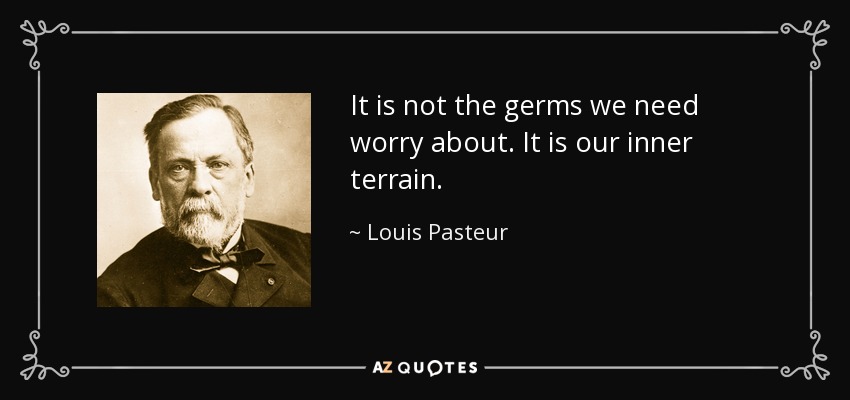Germ theory vs terrain theory and our innate immunity
Germ theory has become the dominant scientific narrative, explaining that external bacteria and viruses invade the body to cause illness and disease, the result of which can be seen in the fear and panic currently gripping the world. But there’s another theory called terrain theory that offers us insight into our body’s innate immunity. Today terrain theory is often denounced as pseudoscience, however the world’s most famous proponent of germ theory Louis Pasteur is reported to have recanted his work on his deathbed, stating "It is not the germs we need worry about. It is our inner terrain."

Terrain Theory
Terrain theory originated alongside germ theory in the 1850s, and was coined by Antoine Béchamp. This theory is focused on the terrain, i.e. the body, and puts the emphasis on maintaining a state of wellness and internal balance to stave of disease. Once this terrain is compromised it gives the disease causing pathogens, whether internal or external, a chance to proliferate, leading to disease.
This internal balance also includes the microbiomes in the gut and on the skin. Our bodies contain billions of bacteria, many of which can cause inflammation and disease if they multiply beyond the body’s capability to keep them in check. Chronic stress caused by anxiety and depression have been shown to negativity impact the gut microbiome, which in turn dysregulates immune response.1, 2, 3 On the other hand, good nutrition and wellbeing can positively influence gut bacteria and improve immunity. Similarly, an imbalance in the skin microbiome can be caused by the overuse of chemical cleaners and antibacterial agents, leading to acne, dermatitis, lesions and infection.4, 5 Toxic chemicals, pesticides, herbicides and even preservatives can disrupt our natural bacteria, especailly when ingested.
As important as our microbiomes are, our emotional and mental health play a pivotal role in our immunity, and our ability to recover from disease. Chronic stress causes issues with our digestive system, circulatory system and hormonal system. Stress induced hypertension results in damage to the arterial walls as small lesions begin to form and cholesterol builds up, leading to heart disease.6 Chronic stress has also been shown to reduce the number of T-cells that fight off infection.7 Make no mistake – stress can kill.
Germ Theory
Germ theory on the other hand focuses on external pathogens (bacteria and viruses) invading our body. Popularised by Louis Pasteur, and aligned with the politics of the time, germ theory became the scientifically accepted theory, although both Béchamp and Pasteur claim to have disproved the other’s theory.
And so today we anxiously do battle with germs, destroying them with antibacterial agents and creating super-bugs; our beneficial bacteria the casualties of war as we neglect our greatest weapon. We focus on immunisation instead of creating a healthy ecosystem, effectively externalising the responsibility for our health and wellbeing to doctors and the pharmaceutical industry. This approach naively assumes we understand our complex environment and works to dominate nature, rather than acting in concert with it.
Our Innate Immunity
So which theory is correct? Often in such polarising debates, the truth is somewhere in the middle, and neither theory invalidates the other. And if both are true, we can still improve the terrain.
Studies have shown that regular exercise results in increased immunity, a reduction in symptoms, and an improved outcome against SARS-CoV-2.8 Conversely, those with co-morbidities such as cardiovascular disease, hypertension, diabetes, and pulmonary disease are at greater risk of mortality.9 Obviously this is also true in general, not just for SARS-CoV-2. As children generally have no co-morbidities, and far more T-cells than an adult, they have an almost 100% chance of fighting off the disease, often with minimal symptoms.
There are multiple ways to improve our inner terrain, many of which are free, and none of which will come as much surprise. Good nutrition, exercise, social interaction, sunlight, fresh air, time in nature, meditation, breath-work, fasting and even cold exposure will all improve your health and wellbeing, and your resistance to disease of all kinds.
Our species has co-existed with external pathogens for at least thousands of years, and the body has an innate intelligence that is working constantly to keep us alive. We need to take responsibility for our own health as this is our first line of defence.
(Side-note: If you’d like an example of how rampant censorship is today, take a look at the definition of Terrain Theory in Wikipedia)
Contact me if you need a hand getting your terrain in order.
References
1. Madison, Kiecolt-Glaser (2019). Stress, depression, diet, and the gut microbiota: human-bacteria interactions at the core of psychoneuroimmunology and nutrition. https://pubmed.ncbi.nlm.nih.gov/32395568/
2. Averina et al. (2020). Bacterial Metabolites of Human Gut Microbiota Correlating with Depression. https://www.ncbi.nlm.nih.gov/pmc/articles/PMC7730936/
3. Baileyab et al. (2011). Exposure to a social stressor alters the structure of the intestinal microbiota: Implications for stressor-induced immunomodulation. https://www.sciencedirect.com/science/article/abs/pii/S0889159110005295?via%3Dihub
4. Van Rensburg et al. (2015). The Human Skin Microbiome Associates with the Outcome of and Is Influenced by Bacterial Infection. https://pubmed.ncbi.nlm.nih.gov/26374122/
5. Zeeuwen et al. (2013). Microbiome and skin diseases. https://pubmed.ncbi.nlm.nih.gov/23974680/
6. Oparil et al. (2018). Hypertension. https://www.ncbi.nlm.nih.gov/pmc/articles/PMC6477925/
7. McLeod (2010). Stress, illness and the immune system. Simply Psychology. https://www.simplypsychology.org/stress-immune.html
8. Lee et al. (2021). Physical activity and the risk of SARS-CoV-2 infection, severe COVID-19 illness and COVID-19 related mortality in South Korea: a nationwide cohort study. https://bjsm.bmj.com/content/bjsports/early/2021/07/21/bjsports-2021-104203.full.pdf
9. Kompaniyet et al. (2021). Underlying Medical Conditions and Severe Illness Among 540,667 Adults Hospitalized With COVID-19, March 2020–March 2021. https://www.cdc.gov/pcd/issues/2021/21_0123.htm
